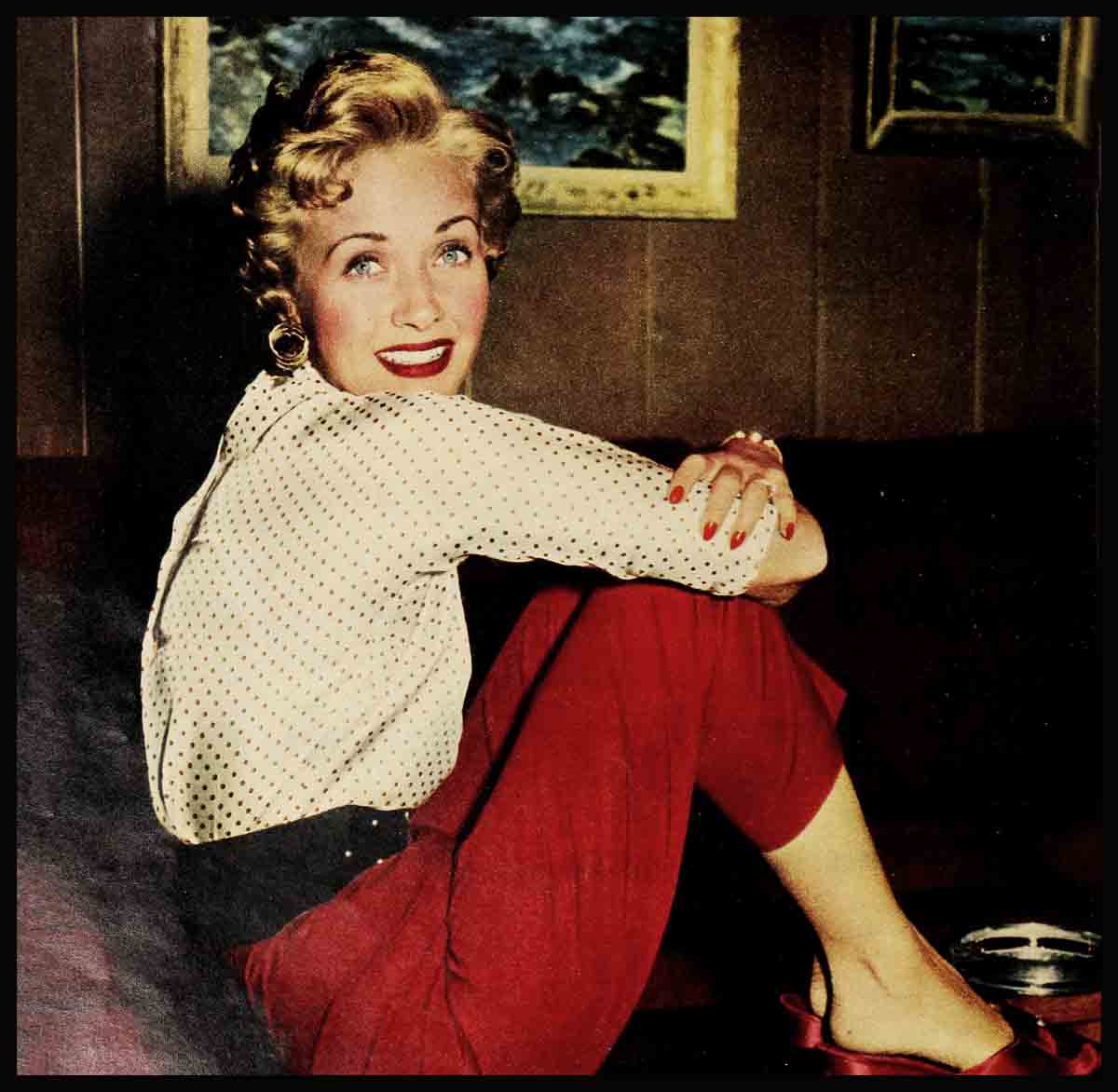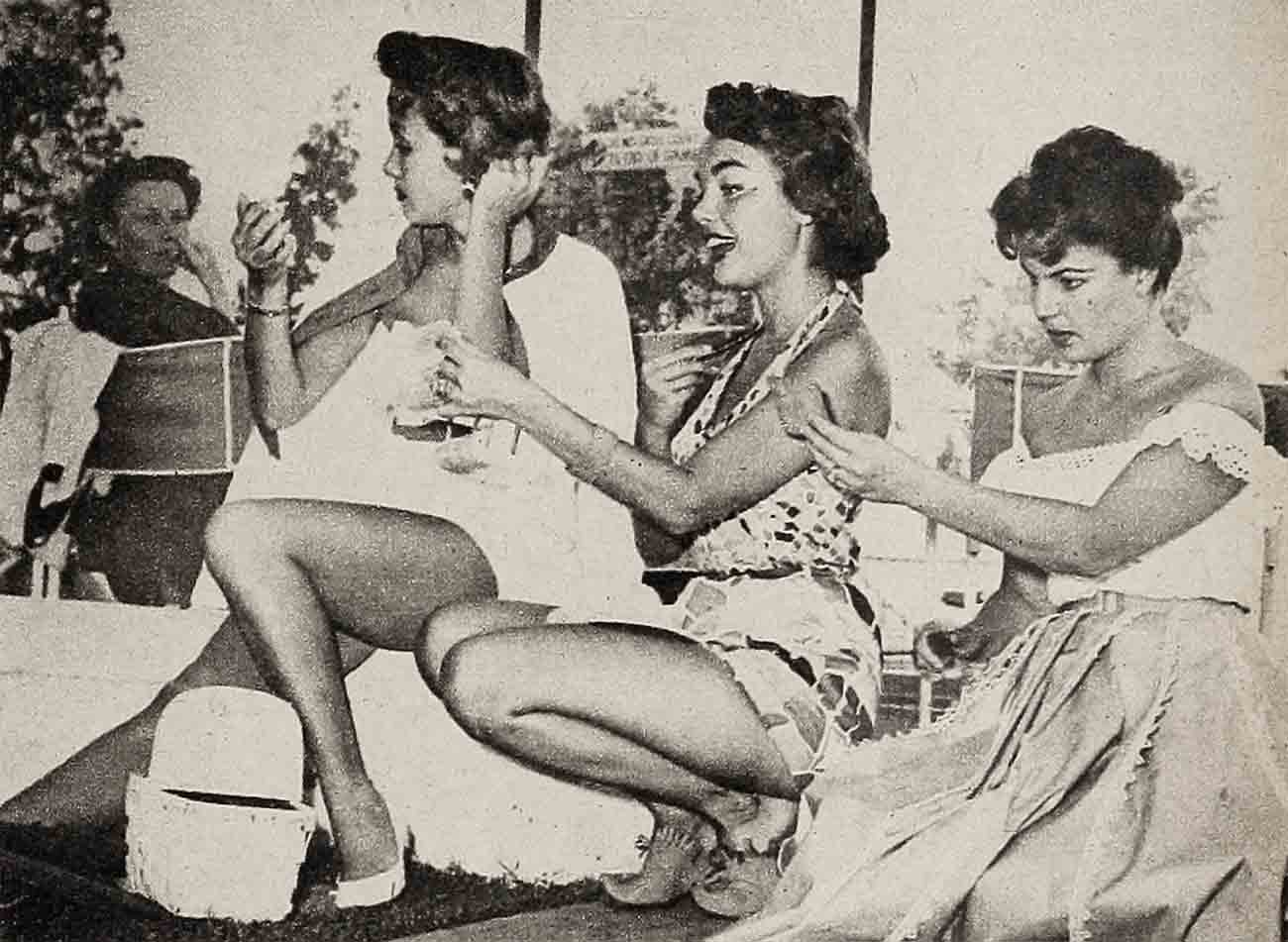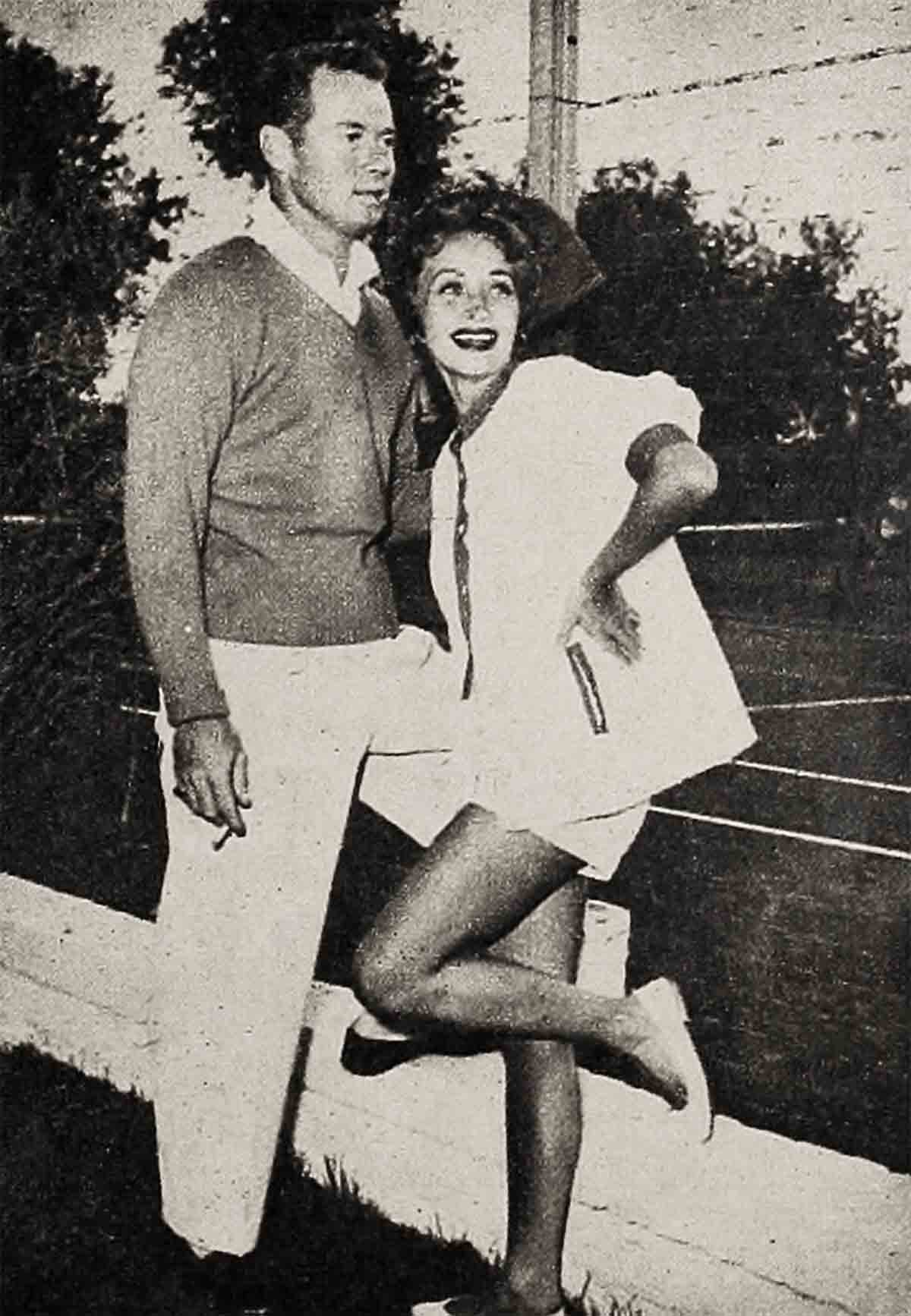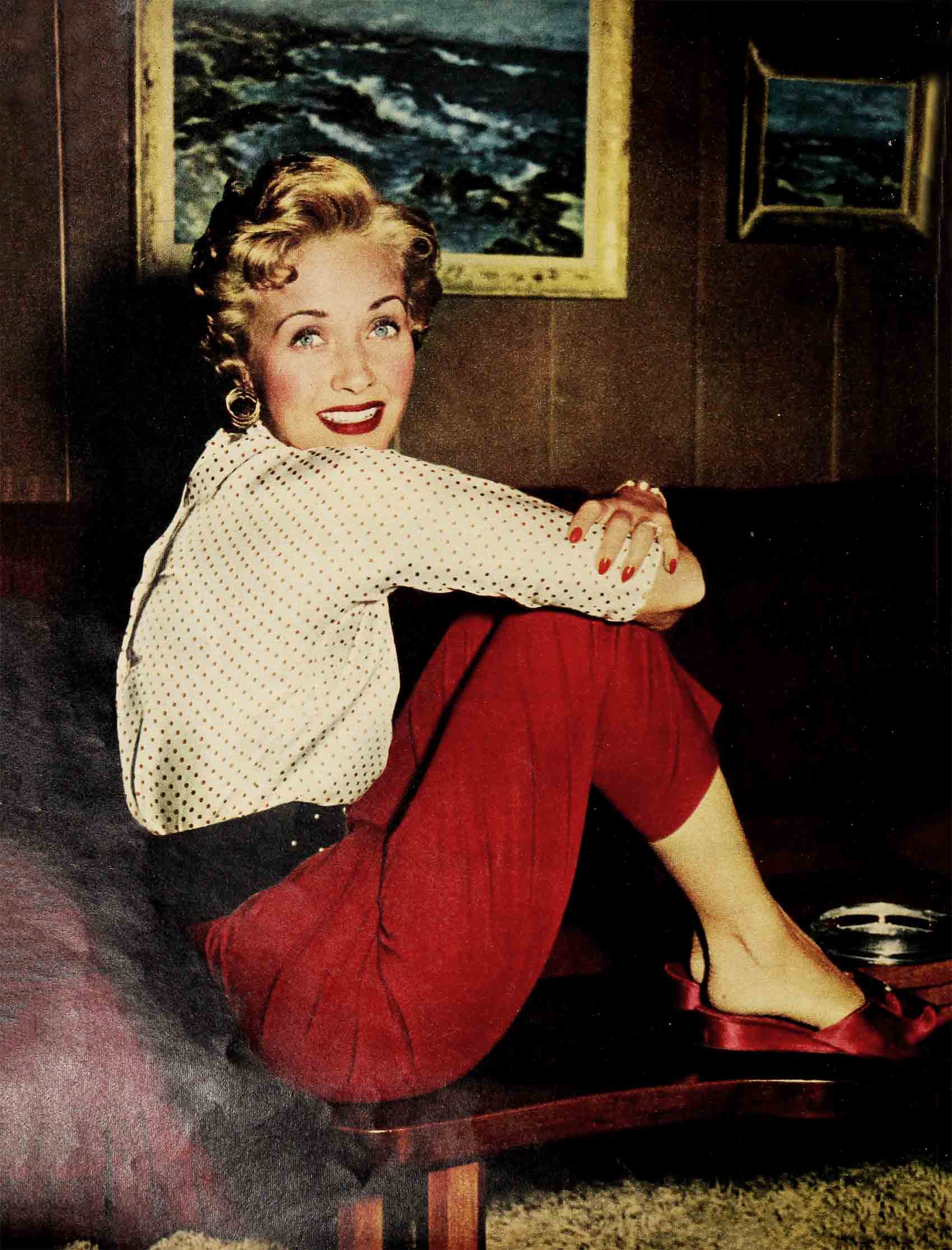
“I Loved And Lost” Says Jane Powell
In Hollywood’s hectic, passion-ridden history there have been countless victims of countless unhappy love affairs. For years the community has been dotted by tear-stained actresses who have picked up their shattered hearts, cemented them with their own will power, and faced the world anew with hope and faith.
Yes, Hollywood has seen many such women. But rarely have we seen anyone with the guts and honesty and indomitable courage of little Jane Powell.
Last year when she was twenty-three, this petite, lively, singing star happened to fall in love with Gene Nelson, a blond, blue-eyed dancer in his middle thirties.
Both of them were married, unhappily so; both were parents. Both were and are respectable and both were starring in Jane’s first loanout, Three Sailors And A Girl.
Both knew they had no right to fall in love. “I did everything to avoid it,” Jane says. But the chemistry of attraction and the propinquity—“I’d just look at her across the table,” Gene recalls, “at the cute little face and my heart would start to beat in double time”—all of it seemed to be a manifest destiny, a conspiracy of circumstance to throw them together.
Studio executives told them their behavior was adolescent. Friends warned them not to break up their separate homes, but passion was spinning the plot. The hope for the future was laden with promise. (“Gosh! When I think of how well it might have worked out. We could have had a husband-and-wife dance act. We could have done so much together. After all, Gene is such a sincere person.”) It’s hard to condemn Jane Powell for divorcing a husband she no longer loved.
But Hollywood does not have as many understanding people as you might imagine. Furtive love and infidelity might be understood. But when Janie announced that she was going to divorce Geary Steffen and Gene announced that he was contemplating a divorce from Miriam, how the high and mighty bellowed!
“You’re out of your mind,” Janie was told last spring, “to even think of divorcing Geary. Don’t you realize that all over America you have been played up as the happiest couple in Hollywood. You have two darling children and a great career. People everywhere remember you as that sweet little darling from Portland. How can you do this? You’re ruining your life. For what, Janie? In heaven’s’ name, for what?”
For love, she said. On August 6, 1953, Suzanne Burce—Jane’s real name—filed for divorce.
Toward her husband, a pleasant, garrulous young man addicted to surf-skiing, she demonstrated good will. She gave him more money than he had contributed to their four-year marriage. She gave him real estate, a promissory note for $16,000, a promise to pay the income tax—everything he wanted. She did this because her heart was running over with love for Gene Nelson.

When her lawyer, Sam Barchis, said, “Now, wait a minute, Janie. Let’s fight some of Steffen’s demands,” her head. “No, Sam. Give him everything he wants. I must have my freedom at once.”
Freedom for what? Freedom to be with Gene Nelson, freedom to sit at his table and watch as he danced for the nightclub crowds, freedom to snuggle up in his arms on the dance floor, freedom to go to the races with him, to be next to him, to look into his eyes and feel his presence and know all his hopes and desires and dreams—freedom to be his wife.
For a few fleeting months Jane Powell knew most of this freedom and luxuriated in her love. Spending her spare time with her children and Gene was a kind of paradise. These were the three people she loved best in all the world.
Gene’s wife Miriam went to see her lawyer, Bernie Silbert, to discuss financial settlement preceding the anticipated divorce. Miriam is a fair and understanding girl. She and Gene had separated before. If Gene wanted someone else for his wife she would not be the insurmountable obstacle. She told her lawyer that all she wanted was a guarantee of $400 a month, less than $100 a week for herself and her son Chris. This was to come out of 25% of Gene’s gross income. But it must be remembered that his net income is small by Hollywood standards.
Fred Martino, Gene’s lawyer, thought this was too much to ask. Gene began to think so, too. And from that moment on the great, overpowering love he had felt for Jane Powell began to change. Gene began to ask himself questions. In leaving Miriam and Chris was he doing the right thing? If he married Jane Powell, wouldn’t people always refer to him as Jane Powell’s husband? Wouldn’t she be the big breadwinner?
If love starts to wane, it’s hard to hide the waning from the girl you loved if she has any perception at all. Jane Powell knew instantly that something was wrong.
Jean began to ask questions. “I couldn’t help myself. I’m that kind of a person. I’ve got to know where I’m heading. I need a goal. I just can’t live in a vacuum. I could tell from Gene’s behavior that he was having a lot of problems. Finally, I asked him if he wanted to stay or go.

“He said that he wanted to go. There was nothing I could do. I let him go.”
“Perhaps you put too much pressure on him at the wrong time?” Janie was asked.
“Perhaps I did,” was her reply. “But I had a lot to consider. My children, my future. I had to bring the whole thing to a head. I forced the situation and I admit it. I began to ask questions and Gene couldn’t answer them.”
“What questions?”
“Questions about the future. You see, in many ways Gene is a wonderful person. He’s self-sufficient, for instance. I’m not.”
“Do you need a lot of people?”
“No, just one. Just one and I’m fine. But I’m not happy alone. I need someone.”
“Do you think you’ve found that someone in Pat Nerney?” (Mona Freeman’s former husband.)
“Well, he’s very nice.”
“Are you planning to marry him?”
“I can’t say. I wouldn’t dare say. My divorce isn’t final until August. He’s nice to go around with. I’m very funny. I don’t like to be a girl around town. It’s nice to have a steady escort.”
“There’s a rumor that Pat is going to Africa on a safari this summer with the Pat Di Ciccos, and that he plans to take you along as his bride. What about it?”
“This is the first I’ve heard of it.”
“It is all over between you and Gene, isn’t it?”
“I’m afraid so.”
“Well, in retrospect, would you say that what you felt for Gene was more infatuation than it was love?”
“It was a real love affair. I’d never chalk it up to infatuation. It was love, all right. I loved and I lost.”
“Are you heartbroken?”
“No, I wouldn’t say that. After all, you can get over pretty nearly everything.”
“Even love?”
“Even love.”
“Have your feelings for Gene changed?”
“He is one of the most sincere people I’ve ever known and I’ll never change my feelings about him.”
“Have you seen him or spoken to him since you broke up?”
“No, I haven’t. He’s a quiet sort of fellow and you don’t hear much about him around town. Have you seen him?”
“He was in New York for an Omnibus TV show, you know, and he’s been down to the desert and down to Balboa and on the Ethel Merman tv rehearsals—If Gene were to come back tomorrow and say, ‘Let’s take up where we left off,’ what would your reaction be?

“Would you take him back?”
Well I just don’t know. This whole thing upset-me very much. I was very much in love with him. I guess I still am. I thought we would have a very wonderful life together. If he was worrying about being the top man in our house—I’d never have made him feel anything else. The difference in earning capacity—well, I’ve never worried about money. You just have to go out and do your work as well as you can. With a man I guess it’s very difficult. I guess Gene had a lot of things on his mind.”
“It was he, who suggested the break?”
“Yes.”
“But would you still take him back?”
“Is Miriam going to take him back?”
“She has taken him back before. She’ll probably take him back again. I think she understands that he’s a complex man and in the past she has always been patient and forgiving. But would you take him back? That’s the question.”
“I just don’t know. Just don’t know. I hope Gene will Straighten himself out and find happiness.”
“Are you happy?”
“I’m very happy—don’t have the time to be sad. I’m finishing a picture, A Bride For Seven Brothers. Then I fly to Italy and sing there at a benefit for crippled children; then I fly to Brazil for the film festival. I won’t be home before March, and then we’re moving into a new house, so you can see.”
“You’re sure you’re not running away from something?”
“What do you mean?”
“Aren’t you carrying a torch for Gene?”
“I guess I am.”
“If Gene hadn’t come along, would you have divorced Geary, anyway?”
“It would have happened sooner or later. This I know. If I really wanted to go back to the old ways, I could have, couldn’t I? I’m glad it happened when it did because now it’s better for everyone concerned. And I’m still young and have my life before me. No, I don’t regret the divorce one bit.”
“Does Geary visit the children frequently?”
“Yes, he’s very good about that.”
“Don’t you ever look back and wonder why you ever got married in the first place?”
“I was insecure and always afraid of loneliness. And there comes a time in every girl’s life when she feels that she simply must get married.”
“How do you feel about the future?”
“I feel wonderful about it, especially about all this travel. When I was a girl in Portland I used to say, ‘My, if some day I could only get to New York.’ And now I’ll be traveling all over the world. It’s really very exciting.”
“Maybe you’ll find some exciting new man overseas. Have you got your eyes open for that?”
“In the future I hope to pick the right man. I certainly don’t want to go through this again.”
“Deep down in your heart, do you think the decision that you and Gene arrived at—not to see each other any more—was the right decision? Don’t you believe that perhaps you have thrown away the one great love in your lives?”
“That’s hard to tell. It’s difficult to evaluate anything when you’re close to it. And love is hard to sustain when there are so many. obstacles. After a while they just wear you down. And one shouldn’t live in the past. I’m going right ahead and I guess Gene is, too.”
That conversation with Jane helps to show why many interviewers say that no actress in Hollywood is more candid, more honest or more lovable than Jane Powell. Hurt and disappointed she may be, but there is no bitterness toward anyone. She doesn’t permit herself to brood.
The wonder of it all is that any man could give her up. In relinquishing his hold on her heart, Gene Nelson gave up a young woman who has sex appeal, top-flight talent, a sunny disposition, a tremendous earning potential and the respect and admiration of her fellow-workers.
In the years to come Gene Nelson may look back and wonder—and this wondering, this pondering, this debate between heart and mind, this pent-up anguish may be the price for Jane Powell’s love, once his, then discarded.
THE END
—BY IMOGENE COLLINS
(Jane Powell can be seen currently in MGM’s Athena.)
It is a quote. MODERN SCREEN MAGAZINE APRIL 1954





No Comments